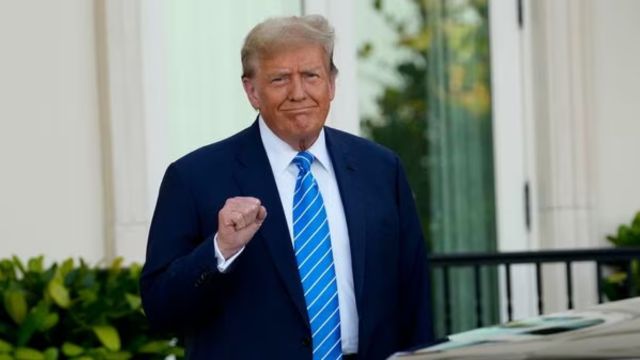A judge from a New York appeals court has denied former President Donald Trump’s plea to postpone his hush-money criminal trial, set for April 15th, as he continues to push for a change of venue outside of Manhattan.
The decision was made on Monday, just a week before the start of jury selection.
Trump’s legal team made the argument during an emergency hearing that the trial should be delayed in order to pursue a change of venue, relocating it from the predominantly Democratic Manhattan.
According to a report from the New York Times, former President Trump is preparing to sue the judge in his New York hush-money case. This move comes just a week before the highly anticipated trial and is seen as another attempt by Trump to delay the legal proceedings against him.
In a recent statement, Donald Trump expressed his belief that each state in the United States should have the authority to determine its own abortion laws. This stance highlights the ongoing debate surrounding reproductive rights and the role of the federal government in regulating such matters. Trump’s position aligns with the principle of states’ rights, advocating for a decentralized approach to legislation on this contentious issue. By giving states the power to establish their own abortion laws, Trump emphasizes the importance of individual states in shaping policies that reflect the values and beliefs of their respective populations.
According to court records and information from two unnamed sources familiar with the situation, there are reports of sealed documents being filed in an attempt to delay the trial and contest a gag order set by the judge.
According to the paper, Mr. Trump’s unconventional approach, which takes the form of a lawsuit, is unlikely to be successful, especially given its proximity to the trial.
Trump has entered a plea of not guilty to 34 criminal charges associated with hush-money payments made to Stormy Daniels, an adult film star who alleged an affair with him.
The judge in the case, Juan Merchan, and members of his family have been the target of repeated attacks by him, with allegations of political bias.
The first criminal trial involving a former US president is set to take place in Manhattan next Monday.
According to the Times, Trump was also anticipated to request an appeals court to relocate the trial from Manhattan, his hometown before he moved to Florida after his presidency. However, it is worth noting that Manhattan is known to be a predominantly Democratic area.
It was also considered highly unlikely that the gambit would be successful.
According to Harry Litman, a former US attorney turned law professor and commentator, Donald Trump’s decision to personally sue Merchan in the appellate division is similar to his previous actions in Palm Beach, Florida. Litman compares Trump’s move to when a judge allowed him to deviate from the original course of action in his classified information case.
“But this won’t happen here,” he exclaimed. “Just imagine if a criminal defendant could actually do this…”
According to The Times, the lawsuit will take the form of an Article 78 action, which is a legal recourse available under New York laws to challenge state agencies and judges.
Trump is currently facing 54 criminal charges, with 40 of them filed in Florida. These charges are related to his alleged retention of classified information after leaving office. Additionally, he is facing 14 charges for his attempt to overturn the 2020 election, with 10 charges in Georgia and four charges in Washington DC.
In New York, Trump is currently dealing with two civil cases that could result in multimillion-dollar penalties. One case involves tax fraud, while the other is related to a defamation claim stemming from a rape allegation that a judge has deemed to be “substantially true.”
Trump denies any wrongdoing and asserts that he is a victim of political persecution. He is making efforts to postpone all the cases against him until after the presidential election in November.
If he were to win against Joe Biden and regain the presidency, he would have the power to dismiss federal charges related to the classified information case and four charges of election subversion. However, dealing with state charges would present more challenges.
Last week, in the New York hush-money case, Merchan denied an attempt to delay the trial until the US Supreme Court rules on Trump’s claim of immunity regarding any act committed in office. This claim was lodged in his federal election subversion case.
Merchan has also declined one request to recuse himself and is widely expected to reject another.

